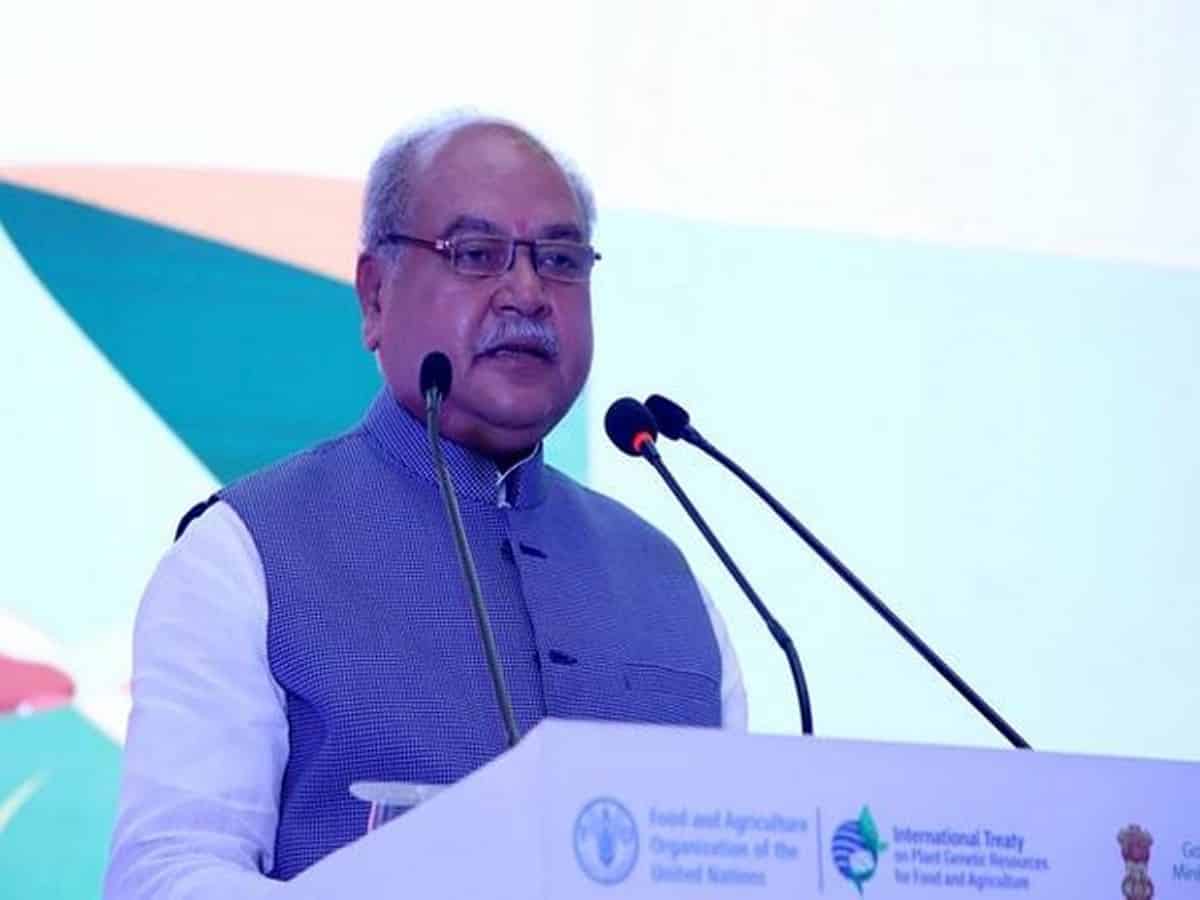
New Delhi: Amid rising air pollution in the national capital, Union agriculture minister Narendra Singh Tomar on Friday expressed concerns over politics being played on the stubble burning issue and urged Delhi as well as neighbouring states to take steps to curb the menace.
There is more discussion on “politics” surrounding stubble burning than its impact on land and what steps farmers should take to curb it, Tomar said.
He also rued that stubble burning incidents are rising despite the Centre providing crores of funds and machines to tackle the problem, saying it is definitely a cause of concern.
At an event here, Tomar appealed to four state governments — Punjab, Uttar Pradesh, Haryana and Delhi — to take steps to control stubble burning by making use of available solutions such as Pusa decomposer, a bio-decomposer technique that converts stubble into compost much faster than usual.
Last week, the minister held a review meeting with state government officials concerned on the stubble burning situation which has resulted in severe pollution in the national capital.
Tomar also said that he is ready to meet chief ministers of respective states in case they want to have further discussions on the issue.
While addressing the day-long event on ‘Pusa decomposer’, Tomar said that ever since stubble burning has become a major issue, the Centre, states, and judiciary have taken note of it, and schemes also have been implemented to deal with the menace.
Pusa decomposer, developed by the Indian Council of Agricultural Research (ICAR), is cheaper and easier to use. It not only controls stubble burning but also improves the soil fertility and productivity of soil, he added.
Every year, stubble burning in neighbouring states during the paddy harvesting season contributes significantly to air pollution in the national capital and northern India.
For management of stubble, the Centre has provided Rs 3,138 crore to four states since 2018-19 and 2 lakh machines have been made available to them. Out of the total amount, more than Rs 1,400 crore has been given to Punjab, Rs 900 crore to Haryana, Rs 713 crore to Uttar Pradesh and Rs 6-7 crore to Delhi, Tomar said.
“If those machines (like Happy seeder, a tractor mounted machine that cuts and lifts rice straw and sows wheat into the soil, and deposits the straw over the sown area as mulch) are put to use fully, there won’t be a problem. If states want to control it, then the answer lies in using whatever solutions are available at present,” he said.
Asserting that Pusa decomposer is a successful technique for decomposing the stubble, the minister said, “It is cheaper and easier to use. Farmers have used it. Decomposer will not only control stubble burning but improve soil fertility.”
Some states, especially Uttar Pradesh and Haryana, have done good work and are moving towards a positive direction, he added.
“About 2 lakh machines have been purchased through states… if a state is determined, it can control stubble burning,” Tomar told reporters on the sidelines of the event.
As agriculture minister, Tomar said he feels bad when farmers are blamed for the rise in pollution in Delhi.
“I am agriculture minister and represent the farming community. If pollution in Delhi rises due to farmers, I feel they are blaming me. It is everyone’s responsibility to get rid of this stigma on farmers,” he said.
He emphasised that stubble burning is not a “political issue,” it is affecting both soil and air. But there is more debate on “politics” than its impact on the environment.
“In the evening those not concerned with the topic debate on the issue without any logic. Usually, the discussion is not on what farmers should do to address this problem,” he said.
He said that paddy is grown and machines are used for harvesting, which results in huge quantities of stubble. “The discussion is necessary on how to manage this stubble and what steps farmers, scientists and the governments should take”.
Agriculture secretary Manoj Ahuja said, “stubble burning has posed a big challenge before us and we have to address this at the earliest. About 55 per cent stubble burning happens in Punjab while rest in Delhi, Haryana and very less in Uttar Pradesh and Rajasthan.”
In Punjab, farmers burn the paddy stubble as they have less time for planting wheat. Several steps have been taken to promote short duration paddy varieties that can be harvested in 135-145 days instead of 165 days of present paddy variety, he said.
About two lakh machines like ‘Happy seeder’ and ‘Smart seeder’ have been made available to the farmers and even Pusa decomposer is successful in converting the stubble into compost, he said, and urged farmers and states to use the available solutions to address the problem of stubble burning.



